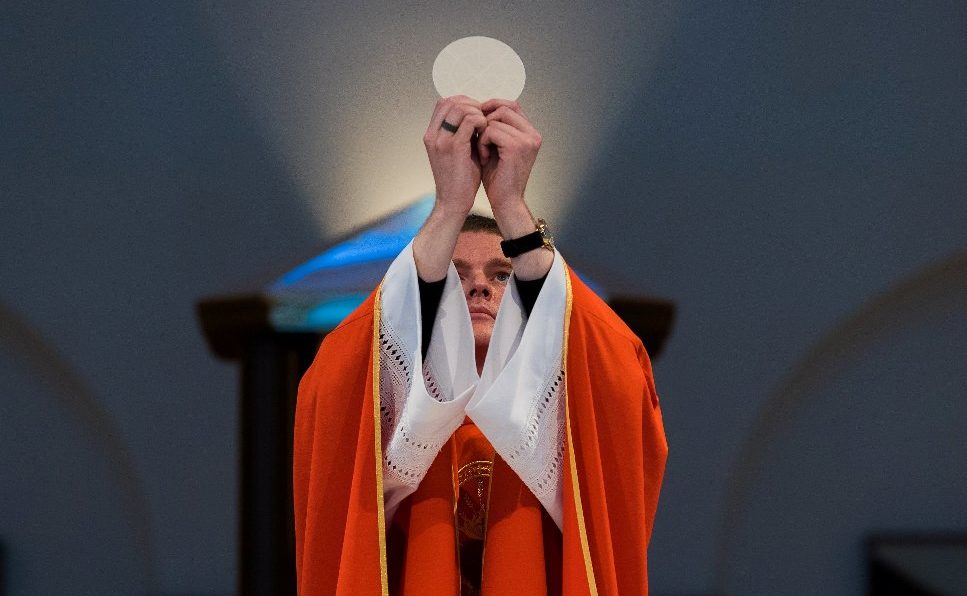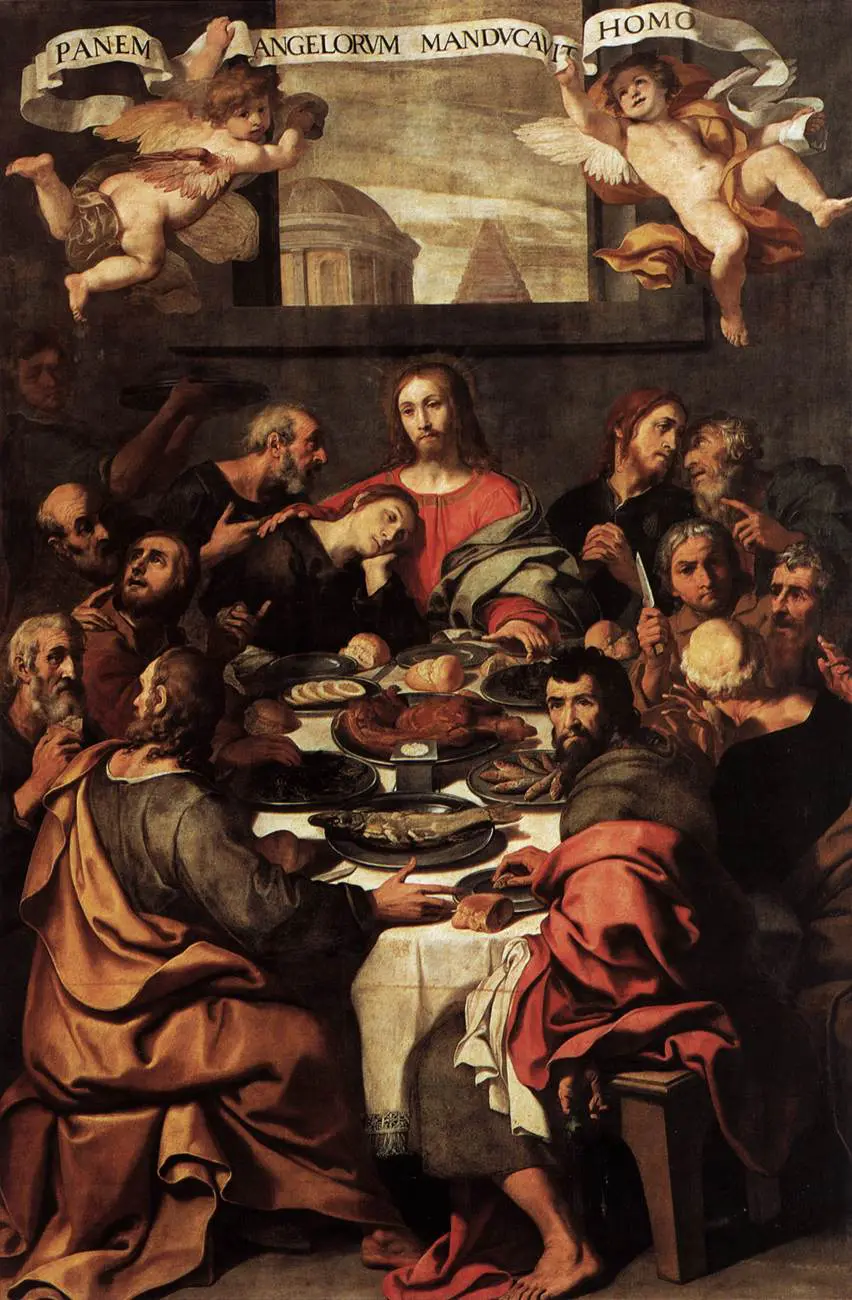
A Catholic priest consecrating Holy Communion. Photo by Josh Applegate.
Many Americans take polls seriously, and many Catholic Americans are discouraged by Pew Research Center’s survey about a so-called majority of Catholics who don’t believe that Jesus Christ is really present in the Holy Eucharist. However, we should beware of any poll, survey or study that claims findings on the thoughts or beliefs of all Catholics or all Americans. We should beware because it’s impossible to survey all Catholics or all Americans.
Gregory Smith, an associate director of Pew Research Center, alarmed Catholic bishops, HLI President Father Shenan Boquet, other priests, and laypeople with his article: “Just one-third of U.S. Catholics agree with their church that Eucharist is body, blood of Christ [1].”
Smith opens with this: “Transubstantiation – the idea that during Mass, the bread and wine used for Communion become the body and blood of Jesus Christ – is central to the Catholic faith. Indeed, the Catholic Church teaches that ‘the Eucharist is ‘the source and summit [2] of the Christian life.’”
That’s true, but starting with the second paragraph, Pew makes sweeping and misleading statements:
But a new Pew Research Center survey [3] finds that most self-described Catholics don’t believe this core teaching. In fact, nearly seven-in-ten Catholics (69%) say they personally believe that during Catholic Mass, the bread and wine used in Communion “are symbols of the body and blood of Jesus Christ.” Just one-third of U.S. Catholics (31%) say they believe that “during Catholic Mass, the bread and wine actually become the body and blood of Jesus.”
Like Father Boquet, many Americans have witnessed distressing crises of faith among Catholics. Our entire foundation as Catholics rests in the True Presence and without it we are deprived of the chief source of grace. As Servant of God Father John Hardon, S.J. taught [4]: “Once we say that the Holy Eucharist is Jesus Christ, we immediately see that it is He who is the final source of the graces which the world needs to not only cope with the culture of death but to promote the culture of life.”
Pivotal Questions and Answers
As Father Boquet says, this Pew survey caused widespread discouragement among Catholics, so I examined Pew Research Center’s “methodology” and asked them if I properly understood their findings. Hannah Tiner graciously replied, and here are the details you need to know:
- Pew surveyed Catholics and non-Catholics
- The total sample size (meaning the number of people who replied) is 10,971 respondents
- Only 1,835 of the those respondents declare themselves to be Catholic.
Realistic Numbers
The Center for Applied Research in the Apostolate (CARA) [5] has the most accurate count of Catholics in the USA. Their numbers are most accurate because the count is based on parish registration provided by Catholic dioceses and archdioceses. It represents “figures for those 195 dioceses or eparchies who belong to the United States Conference of Catholic Bishops [USCCB]. This includes the 50 states, the District of Columbia, the U.S. Virgin Islands, and all U.S. military personnel stationed overseas.”
CARA shows that in 2018 the Catholic population of parish-connected Catholics was 68.7 million persons.
CARA also states that in 2018 the Catholic population was 76.3 million people according to a “self-identified, survey-based estimate.” In other words, some Catholics, maybe a large number, don’t formally register with parishes. For much of my adult life, I didn’t register at a parish until I bought and settled in my current home.
Prior to Easter 2019, the USCCB announced [6] that 37,000 people were joining the Catholic Church in the USA.
Bottom line: CARA’s counts show that the U.S. Catholic population continues to grow instead of shrinking.
Thus, Pew’s 2019 survey of 1,835 Catholics compared to CARA’s 2018 count of 68.7 million is a microscopic fraction of Catholics. It seems Pew surveyed approximately 0.002% of Catholics in the USA and the number of 1,266 nominal Catholic non-believers who answered Pew’s survey is smaller.

“The Last Supper” by Daniele Crispi (1624-25) at Pinacoteca di Brera in Milan. Photo thanks to the Web Gallery of Art.
What Should the Church Do?
Now let’s put this into perspective. It is a pity if merely one Catholic doesn’t believe that Jesus Christ Almighty, true God and true man, is really present body, soul, and divinity in both species of the Eucharist under the appearance of bread and wine.
Nevertheless, don’t get depressed because with knowledge and God’s grace, all of us can increase our faith and we can help doubters with goodwill to gain faith too.
At many Sunday Masses, I’ve heard priests quoting polls about Catholics and, last Sunday, one of my favorite priests quoted this Pew survey! Then he beautifully taught the congregation about the reality of Christ in the Eucharist and how we can evangelize in everyday life.
When I asked the pastor of one parish and a deacon from another about this particular survey, they said they believe polls like this truly represent the Church at large.
In preparing parishioners for the sacraments, these ministers ask questions about Catholic dogmas that we need to believe for salvation, and often they are shocked by their parishioners’ replies.
The pastor said many of the people he prepares are ignorant because they don’t have a Catholic education. Hence, he teaches them to enter into Catholic life with full consent, including total belief in and reverence for Christ in the Blessed Sacrament.
The deacon said he believes this Pew poll. He believes it because, for one dramatic example, recently he was preparing a young married couple to get their firstborn baby baptized and raise him in the faith. They didn’t know Who founded the Catholic Church; what the mortal sins are; and when we may take Holy Communion. The deacon was shocked because the couple met in the parish’s school. This is a lesson for parents to monitor their Catholic schools or CCD classes because their children need the truth and they should listen and learn to the best of their abilities.
The priests at my parish not only preach, they teach from the pulpit. They help us to fall in love with Jesus, everything He is and everything that He, God the Father, and the Holy Spirit give to us during every moment of our lives.
They provide daily Masses, a chapel for 24/7 Eucharistic adoration, education, and good counsel. As a result, every Easter converts (sometimes nearly 200) enter the Catholic Church at our parish.
To the 1,266 people who took the Pew survey and think the Eucharist is only a symbol, I can relate. Even though I heard the Gospel at Mass since I was a child, I went to public schools and I was profoundly ignorant. Then, as a teenager, I was shocked by a Protestant’s book warning that the Apocalypse was imminent. It literally scared the hell out of me, and I started reading my parents’ Douay-Rheims Catholic Bible to verify verses in the Protestant’s book. This led me to seek other Catholic books about God, the Church, and history. I wanted to know precisely what Christ said and what it means. Eventually, I went to Christendom College and graduated with a B.A. in Catholic Theology.
The truth is that only God, saints and angels can know the total number of Catholics who believe or don’t believe that Christ is present in the Eucharist.
The truth is we can’t love Truth Himself unless we know Him, and we can’t know Him unless we read the Bible. Furthermore, in the Bible, Saint John the Evangelist tells us [7]: “But there are also many other things which Jesus did; which, if they were written every one, the world itself, I think, would not be able to contain the books that should be written.” This is why the Catholic Church published the Catechism and both of these books are online for everyone in the free world.
Read These Books Online
In John 6, Christ says, “I am the bread of life,” “I am the living bread which came down from heaven,” and He tells us that we need to eat the Bread of Life for “everlasting life.” So I invite you to read the searchable Douay-Rheims Bible [8] annotated by Bishop Richard Challoner. To the best of my knowledge, it’s the most accurate English translation of the Holy Bible online. Also see the best searchable edition of The Catechism of the Catholic Church [9] to search for “Eucharist” and other topics.